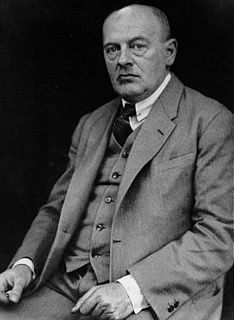A Quote by James Denney
The depravity which sin has produced in human nature extends to the whole of it. There is no part of man's nature which is unaffected by it. Man's nature is all of a piece, and what affects it at all affects it altogether
Quote Topics
Related Quotes
Nature is man's inorganic body -- that is to say, nature insofar as it is not the human body. Man lives from nature -- i.e., nature is his body -- and he must maintain a continuing dialogue with it is he is not to die. To say that man's physical and mental life is linked to nature simply means that nature is linked to itself, for man is a part of nature.
There are hidden contradictions in the minds of people who "love Nature" while deploring the "artificialities" with which "Man has spoiled Nature.'" The obvious contradiction lies in their choice of words, which imply that Man and his artifacts are not part of "Nature" : but beavers and their dams are.
We mustn't be afraid of inventing anything...Everething there is in us exists in nature. After all, we're part of nature. If it resembles nature, that's fine. If it doesn't, what of it? When man wanted to invent something as useful as the human foot, he invented the wheel, which he used to transport himself and his burdens. The fact that the wheel doesn't have the slightest resemblance to the human foot is hardly a criticism of it.
Nothing is more human than for man to desire naturally things impossible to his nature. It is, indeed, the property of a nature which is not closed up in matter like the nature of physical things, but which is intellectual or infinitized by the spirit. It is the property of a metaphysical nature. Such desires reach for the infinite, because the intellect thirsts for being and being is infinite.
There is that in the soul of man which must respond to the highest in virtue. It may not respond at once. Human nature can easily be over-faced by examples too remote and austere. Moreover, human nature can easily deny God because the whole race has long been in rebellion against Him. Yet there is that in human nature which calls out to the supreme examples of virtue: owns, as it were, the intention of God who made it, and feels the unmistakable homesickness of the soul.
This thou must always bear in mind, what is the nature of the whole,
and what is my nature, and how this is related to that, and what
kind of a part it is of what kind of a whole; and that there is no one
who hinders thee from always doing and saying the things which are
according to the nature of which thou art a part.
Ressentiment is a self-poisoning of the mind which has quite definite causes and consequences. It is a lasting mental attitude, caused by the systematic repression of certain emotions and affects which, as such are normal components of human nature. Their repression leads to the constant tendency to indulge in certain kinds of value delusions and corresponding value judgments. The emotions and affects primarily concerned are revenge, hatred, malice, envy, the impulse to detract, and spite.
Faith affects the whole of man's nature. It commences with the conviction of the mind based on adequate evidence; it continues in the confidence of the heart or emotions based on conviction, and it is crowned in the consent of the will by means of which the conviction and confidence are expressed in conduct.
































